Revolutionizing Psychology through AI
Artificial Intelligence (AI) is increasingly integrated into psychological evaluations, transforming how mental health disorders are diagnosed, monitored, and treated. From deep learning analysis of neuroimaging data to AI-powered chatbots offering accessible support, these technological tools enhance accuracy, efficiency, and reach. As AI continues to develop, understanding its applications, benefits, limitations, and ethical considerations becomes vital for mental health professionals and patients alike.
Current Applications and Methods of AI in Psychological Assessments
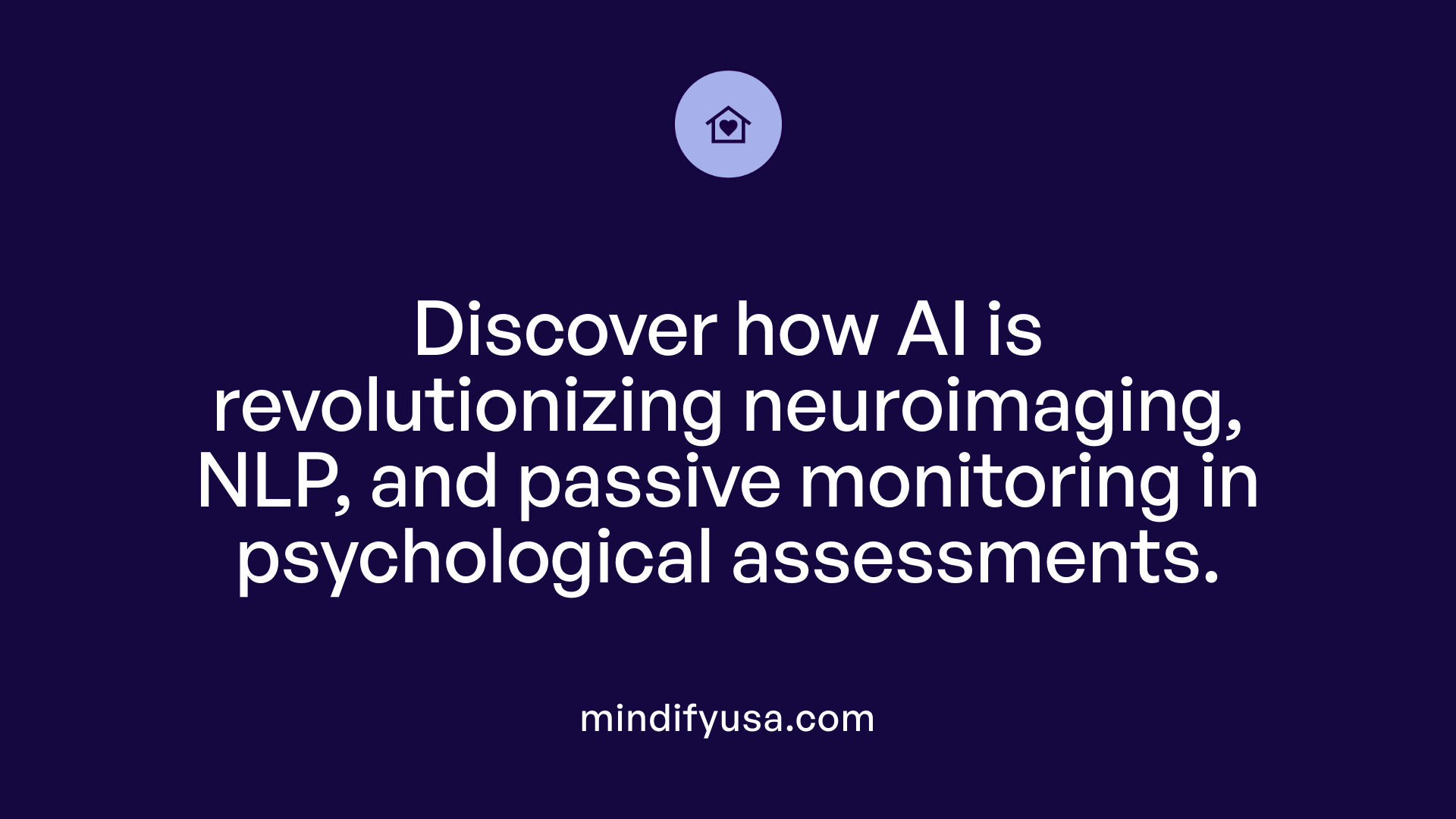
What are current applications and methods of AI in psychological assessments?
Artificial Intelligence (AI) has become a vital tool in modern psychological assessment, offering innovative methods to improve diagnosis, monitoring, and treatment. One prominent area is neuroimaging analysis. AI models, including deep learning algorithms, analyze large datasets of neuroimaging scans such as functional Magnetic Resonance Imaging (fMRI) and Electroencephalography (EEG). These analyses help identify biomarkers and patterns associated with mental health conditions like depression, autism spectrum disorder, schizophrenia, and Attention Deficit Hyperactivity Disorder (ADHD). By detecting subtle neural differences, AI supports earlier and more accurate diagnoses.
Beyond neuroimaging, natural language processing (NLP) is transforming how clinicians interpret textual data. AI employs NLP to evaluate electronic health records, therapy session transcripts, and social media posts to detect early signs of mental health issues. For instance, linguistic patterns, tone, and sentiment analysis can predict risk levels of depression or anxiety, providing clinicians with real-time insights. AI-powered chatbots and virtual therapists utilize NLP to deliver remote therapeutic interventions, offering psychoeducation, coping exercises, and crisis support accessible 24/7.
Social media monitoring constitutes another crucial application. AI algorithms analyze posts, comments, and behavioral cues online to monitor mental health trends and identify at-risk populations. This digital phenotyping through social media provides continuous, passive insights into an individual’s mental state, enabling timely interventions before crises emerge.
AI's role extends into early detection and prevention. Machine learning models process data from diverse sources such as social media, wearable sensors, and clinical records to recognize patterns suggestive of emerging mental health conditions. This proactive approach allows for early intervention strategies, potentially reducing severity and improving outcomes.
Personalized treatment planning also benefits greatly from AI. By analyzing patient-specific data, including genetic information, behavioral responses, and clinical history, AI algorithms can recommend tailored therapeutic approaches. This customization enhances treatment effectiveness and patient engagement.
Additionally, immersive technologies like Virtual Reality (VR), combined with AI, are used in exposure therapy and social skills training. Concurrently, passive monitoring devices, including wearable sensors and smartphone apps, track physiological signals—heart rate, activity levels, sleep patterns—which provide further contextual data for comprehensive assessments.
Despite these advancements, responsible AI deployment remains critical. Ethical issues encompassing privacy, data security, bias mitigation, and transparent algorithms are central considerations. Balancing technological innovation with safeguarding client rights ensures AI's applications remain beneficial and equitable.
In summary, current AI methodologies encompass neuroimaging analysis, NLP, social media monitoring, early risk detection models, personalized treatment algorithms, and immersive therapy tools. These technologies collectively expand the scope and precision of psychological assessment, ultimately enhancing mental health care delivery.
AI's Role in Enhancing Diagnosis and Clinical Practice
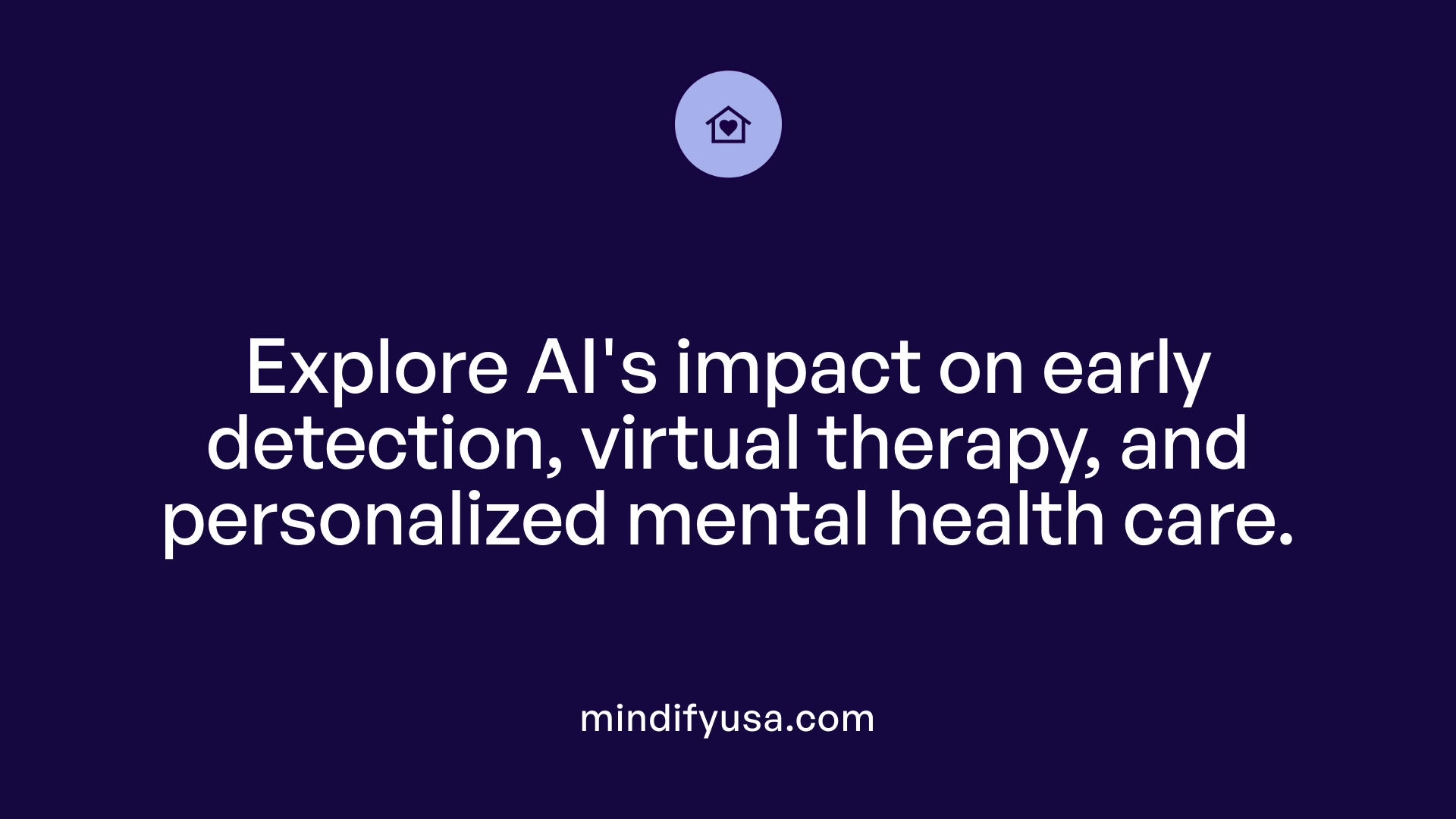
How is AI used in clinical psychology?
Artificial Intelligence (AI) has become a transformative force in the field of clinical psychology. Its applications span from early detection of mental health issues to personalized treatment plans. AI systems analyze vast amounts of data, including speech patterns, facial expressions, and electronic health records, to identify subtle signs of mental health disorders such as depression, anxiety, schizophrenia, and neurodevelopmental conditions like autism spectrum disorder.
One of the most impactful uses of AI is in developing virtual therapists and chatbots. Tools like Wysa and Woebot offer scalable, accessible support that can be especially beneficial in reducing stigma and overcoming barriers to traditional mental health services. These AI-powered virtual agents provide psychoeducation, therapeutic exercises, and crisis intervention, functioning around the clock and serving as an immediate resource for users.
AI technology also plays a crucial role in monitoring patient progress through data collected from wearable devices and digital biomarkers. Continuous data streams allow clinicians to observe behavioral changes and physiological responses in real time, enabling timely interventions and adjustments to treatment plans. This ongoing monitoring supports early warning systems for relapse or deterioration, ultimately improving clinical outcomes.
Moreover, AI enhances teletherapy sessions by analyzing emotional cues such as tone of voice, facial expressions, and physiological signals. This analysis provides therapists with additional insights into a patient’s emotional state, fostering a deeper understanding of their needs and improving therapeutic rapport.
Ethical considerations are integral to AI integration in mental health. Ensuring data privacy, mitigating biases in algorithms, and maintaining the essential human connection are paramount. Psychologists and developers must collaborate to create AI tools that are safe, fair, and supportive of human-centered care.
In summary, AI enriches clinical psychology by facilitating early detection, supporting personalized treatment, monitoring progress, and expanding access to mental health services, all while emphasizing responsible and ethical implementation.
AI's Transformative Role in Psychological Assessment
How is AI transforming psychological assessment?
Artificial Intelligence (AI) has become a vital component in modern psychological evaluation and diagnosis. Leveraging advanced technologies such as Natural Language Processing (NLP) and machine learning, AI tools enable psychologists to conduct assessments more accurately and efficiently. These tools can analyze large and diverse datasets, from speech patterns and written responses to physiological signals, uncovering patterns that might be missed by human observers.
One of the prominent applications of AI is in adaptive testing. Unlike traditional assessments with fixed questions, AI-powered adaptive testing adjusts the difficulty and nature of questions in real-time based on the respondent’s previous answers. This approach offers a tailored evaluation experience, minimizing testing time while maximizing diagnostic precision. It ensures that assessments are accurately calibrated to the individual’s current state, providing more personalized and relevant insights.
Moreover, AI facilitates real-time, personalized assessments. By continuously analyzing data as it is collected, AI systems can provide immediate feedback and modify evaluation parameters. This dynamic process enhances detection of subtle emotional or cognitive cues and allows for on-the-spot adjustments, improving the overall quality of assessment outcomes.
Beyond immediate testing, AI's ability to analyze complex data patterns plays a crucial role in understanding emotional and behavioral states. Algorithms scrutinize speech tone, facial expressions, social media interactions, and physiological signals to identify early signs of mental health issues such as depression, anxiety, and neurodegenerative conditions. These insights support prompt intervention and ongoing monitoring, often at a scale unachievable by traditional methods.
A vital benefit of AI integration is its capacity to reduce human biases during assessments. Human evaluators may unconsciously carry biases related to gender, ethnicity, or socioeconomic status. AI systems, when properly designed with diverse and representative datasets, can promote more objective evaluations. They ensure consistency across different assessments and providers, fostering equitable and fair diagnosis processes.
What is the role of AI in psychological assessment?
AI plays a significant role in psychological assessment by utilizing advanced technologies like Natural Language Processing (NLP) and data analytics to enhance evaluation accuracy and efficiency. It enables real-time feedback, adaptive testing, and personalized assessments that tailor evaluations to individual needs, improving diagnostic precision. AI tools can analyze spoken language, written responses, and behavioral data to identify patterns, detect misconceptions, and assess emotional states, providing deeper insights into a person's mental health. Additionally, AI-driven assessments can reduce human biases, ensure consistent evaluation, and facilitate more frequent and scalable diagnostics. Overall, AI enhances the depth, speed, and fairness of psychological assessments, supporting better mental health intervention and treatment planning.
How does AI analyze behavioral and emotional data?
AI systems analyze behavioral and emotional data by processing a wide range of inputs, such as speech tone, facial expressions, physiological signals, and social media content. These algorithms look for patterns correlating with emotional and mental states. For instance, subtle variations in speech patterns or facial movements can indicate stress, sadness, or anxiety. Physiological data from wearable devices, like heart rate variability or galvanic skin response, provide further insights into emotional arousal.
Machine learning models identify complex relationships between these data points and mental health indicators. They can predict potential issues before symptoms fully manifest, enabling preemptive interventions. This comprehensive approach captures the nuanced interplay of cognitive, emotional, and behavioral aspects, creating a richer picture of an individual’s mental well-being.
How does AI reduce human biases in assessments?
AI reduces biases by standardizing evaluation processes and using large, diverse datasets to inform assessments. Unlike human judgment, which can be influenced by unconscious biases related to race, gender, or socio-economic status, AI algorithms apply consistent criteria across all evaluations. When trained on inclusive data, AI can help detect disparities and promote fairness.
However, it is important to note that AI models are only as good as the data they are trained on. Biases embedded within training datasets can perpetuate inequalities. Therefore, ongoing monitoring, dataset diversification, and transparency are essential to ensure AI assessments are equitable.
In summary, AI enhances psychological assessment by enabling adaptive, real-time evaluation, analyzing complex behavioral cues, and promoting fairness. When integrated responsibly, these tools support more accurate, objective, and accessible mental health diagnostics.
| Aspect | Description | Example/Impact |
|---|---|---|
| Adaptive Testing | Real-time adjustment of questions based on responses | Tailors assessment to individual, reducing testing time and improving accuracy |
| Real-Time Personalization | Immediate analysis and feedback during the assessment process | Enhances detection of subtle emotional or cognitive cues |
| Behavioral & Emotional Data | Analysis of speech, facial cues, physiological signals | Early detection of mental health issues |
| Bias Reduction | Standardized evaluation and diverse datasets | Promotes fairness, reduces influence of unconscious biases |
Understanding AI’s role and capabilities in psychological assessment offers promising avenues for more precise, efficient, and equitable mental health care. Continuous advancements and ethical oversight are essential to harness AI's full potential responsibly.
AI’s Influence on Accuracy and Empathy in Evaluations
How might AI influence the accuracy and empathy of psychological evaluations?
Artificial Intelligence is making substantial strides in improving the precision of psychological assessments. By harnessing vast and diverse datasets—ranging from neuroimaging scans to speech patterns, social media activity, and physiological signals—AI can identify subtle cues indicative of mental health conditions such as depression, anxiety, and neurodevelopmental disorders. Techniques like natural language processing (NLP), facial recognition, and biofeedback enable AI systems to analyze complex behavior and emotional states with notable objectivity.
This technological advancement leads to earlier and more accurate diagnoses, which are crucial for timely intervention. AI-powered tools like chatbots and virtual therapists extend support beyond traditional clinical settings, providing immediate, accessible psychoeducation and intervention for individuals who might face barriers in seeking care.
In addition to enhancing diagnostic precision, AI can support the personalization of treatment plans. By analyzing detailed patient data—such as response patterns and physiological responses—AI systems can tailor interventions to individual needs, potentially increasing the effectiveness of therapy.
However, a critical aspect of mental health care is emotional engagement and understanding, often fostered through empathic connection. Here, the capabilities of AI currently fall short. While AI can mimic certain aspects of empathy—such as recognizing emotional cues or delivering supportive language—it inherently lacks genuine emotional experience and consciousness.
The distinction between mimicking empathy and truly experiencing it underscores a fundamental limitation. AI can simulate empathetic responses that may enhance user engagement temporarily but cannot replace the authentic emotional connection provided by trained human clinicians.
Despite these limitations, integrating AI into psychological evaluations should be seen as a means to support and augment human judgment rather than replace it. AI's strengths lie in its ability to analyze large-scale data with consistency and speed, providing insights that can inform and enhance human-led therapy.
In conclusion, AI significantly boosts diagnostic accuracy through advanced data analysis and real-time assessments. At the same time, its capacity for genuine empathetic understanding remains limited. The most effective approach involves leveraging AI's analytical prowess while maintaining human oversight to preserve the essential human elements of trust, compassion, and emotional resonance in mental health evaluations.
Ethical Considerations in AI-Driven Mental Health Assessment
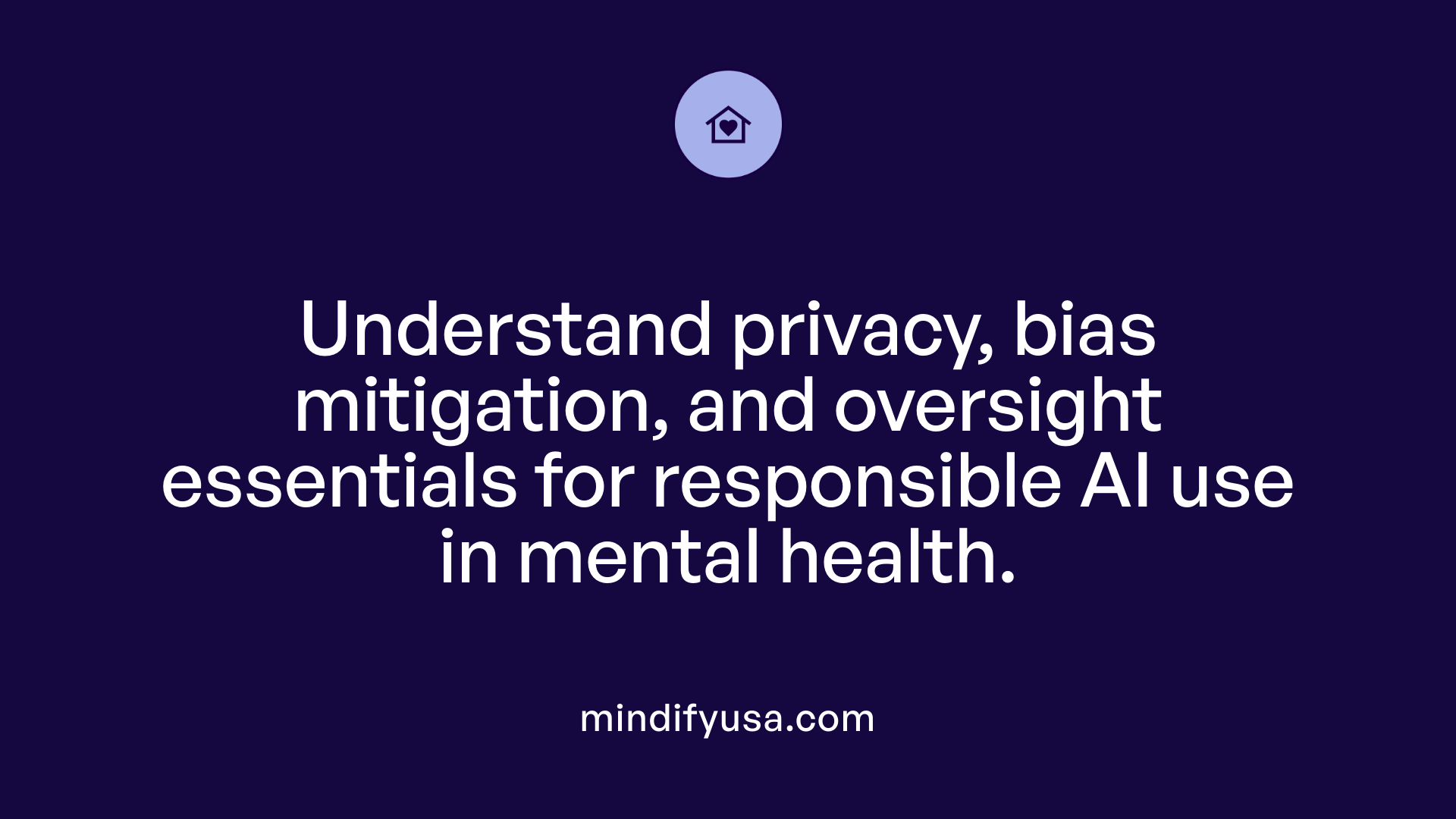
What ethical considerations are involved in integrating AI into mental health evaluations?
Integrating AI into mental health assessments introduces several ethical challenges that must be carefully managed to ensure responsible application.
One of the foremost concerns is protecting patient privacy and ensuring data confidentiality. Mental health data is highly sensitive, and breaches can have serious consequences. Developers and clinicians must implement robust security measures, adhere to regulations like HIPAA, and secure informed consent from clients before using AI tools.
Addressing algorithmic bias is another critical issue. If AI systems are trained on unrepresentative data, they risk perpetuating disparities in diagnosis and treatment, especially for marginalized or minority populations. Ensuring datasets are diverse, carefully monitored, and regularly updated helps mitigate these biases. Fairness and equitable treatment should be cornerstones of AI development.
Transparency and explainability of AI decision-making processes are essential for building trust. Patients have the right to understand how assessments and recommendations are generated. Clinicians need tools that provide clear explanations, balancing data-driven insights with human judgment.
Maintaining human oversight remains vital. AI should support, not replace, clinicians. The human element—empathy, ethical reasoning, and contextual understanding—cannot be fully captured by machines. Clinicians must interpret AI outputs within a broader clinical context to prevent over-reliance on automated systems.
Legal and regulatory standards are evolving to oversee AI applications in healthcare. Compliance with laws, obtaining informed consent, and ensuring safety through clinical validation are mandatory steps. Ongoing monitoring, reporting of adverse outcomes, and adherence to professional guidelines are necessary to uphold ethical integrity.
In summary, integrating AI into mental health assessments demands a multidisciplinary approach that prioritizes privacy, fairness, transparency, human oversight, and legal compliance to ethically harness AI’s potential while safeguarding patient rights.
Future Prospects and Challenges of AI in Psychological Care
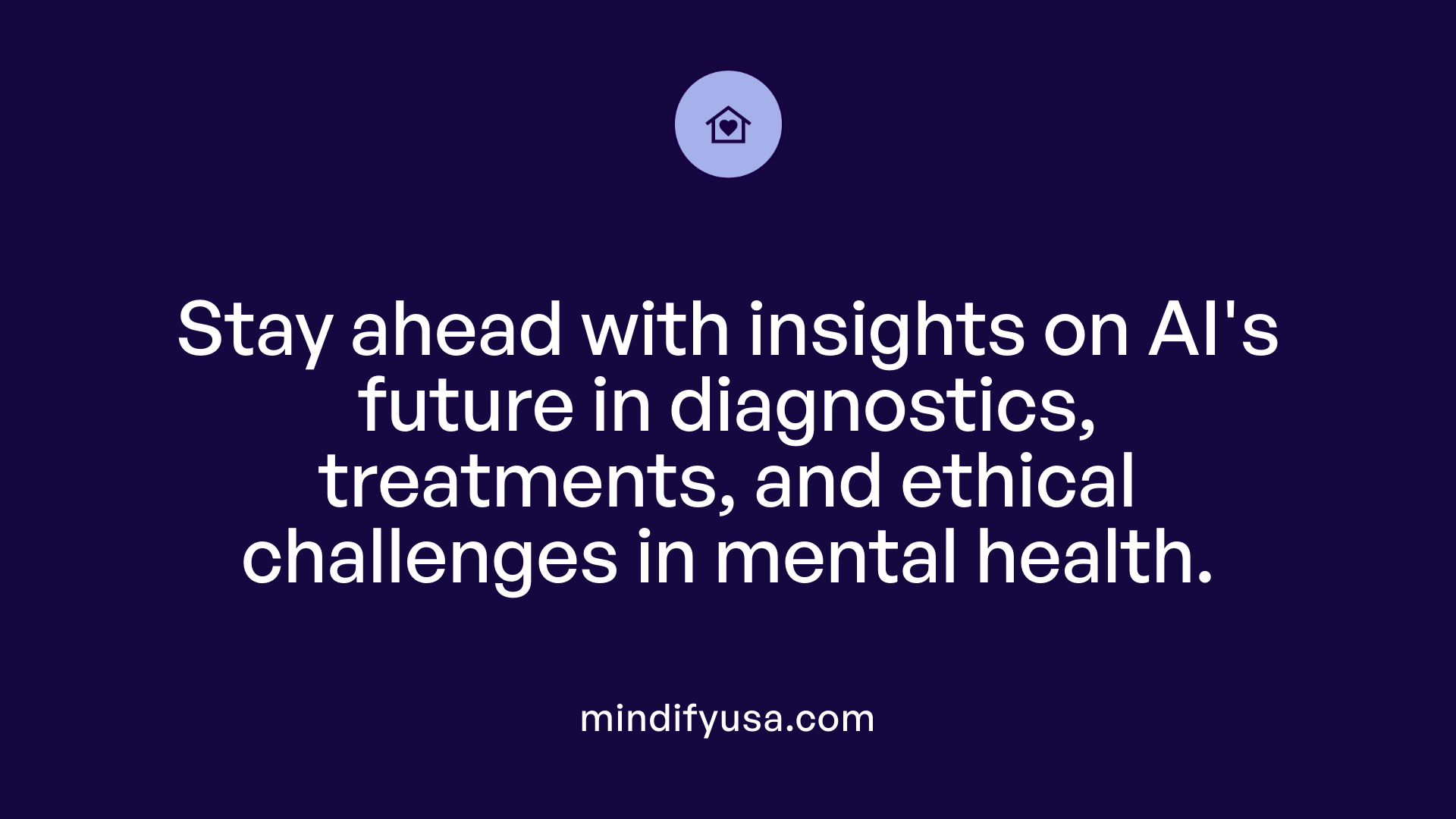
What are the future implications of AI in psychological assessments and treatments?
The future of AI in psychological assessments and treatments holds great promise for transforming mental health care. As technology advances, AI systems are expected to become more personalized and scalable, making services accessible to a wider population. Diagnostic tools equipped with machine learning can analyze large datasets, including neuroimaging, speech patterns, and behavioral data, to identify mental health conditions like depression, anxiety, and ADHD with increased accuracy.
Virtual therapy interventions, such as AI-driven chatbots and virtual assistants, will continue to improve. These tools can provide immediate support, psychoeducation, and therapeutic exercises, extending mental health services beyond traditional clinical settings. Passive monitoring via wearable devices and social media analysis will enable early detection of symptoms, allowing timely intervention before conditions worsen.
Predictive analytics will play a key role in early intervention strategies. By analyzing individual and community data, AI can identify high-risk populations and predict treatment outcomes, helping tailor personalized care plans. These systems could also support clinicians by forecasting the likely success of different treatments, thus optimizing intervention strategies.
However, these advancements are accompanied by ethical dilemmas. Ensuring data privacy and security remains paramount as AI systems utilize sensitive personal information. Reducing algorithmic bias is critical to prevent disparities in mental health services, especially for marginalized populations. Transparency about AI decision-making processes and maintaining human oversight are essential to foster trust and accountability.
The role of human oversight will remain vital as AI systems should support—not replace—therapists. Ethical guidelines and rigorous regulation are necessary to govern AI deployment in mental health care. Professional standards and institutions like the American Psychological Association are developing frameworks to ensure responsible AI use.
AI can enhance the therapeutic relationship by providing consistent, scalable support, and facilitating more tailored interventions. However, maintaining empathy and emotional connection will continue to require human clinicians.
In summary, AI’s future in psychological assessments and treatments involves a balance of innovation and ethical responsibility. While promising more personalized, accessible, and effective mental health services, it must be guided by robust ethics, continuous oversight, and a focus on human-centered care. This integrated approach can lead to a new era of mental health support that leverages the strengths of both AI and human clinicians.
Integrating AI with Human-Centered Care and Ethical Practice
How should AI be integrated responsibly into psychological evaluations?
Incorporating AI into psychological evaluations requires a careful, responsible approach that emphasizes complementing, not replacing, human judgment. Clinicians should use AI tools as supportive resources that enhance their analytical capabilities while maintaining oversight of all diagnostic and treatment decisions.
AI systems should be validated rigorously through research to ensure their accuracy and safety. Transparency about how AI models work, their limitations, and the nature of their recommendations is crucial for building trust. Patients should be fully informed about AI’s role in their assessment, and clinicians need to secure their informed consent before employing these tools.
Protecting patient privacy remains a top priority. AI tools must meet strict data security standards, such as those outlined by HIPAA, ensuring sensitive information is protected from breaches.
Effective integration also involves training clinicians in AI literacy. This includes understanding the underlying principles of machine learning, recognizing potential biases, and knowing how to interpret AI outputs critically. Only with proper education can practitioners effectively leverage AI’s benefits while safeguarding against its risks.
Ongoing monitoring and regular re-evaluation of AI systems are necessary. This helps identify and mitigate biases, improves performance over time, and ensures ethical standards are maintained.
In sum, responsible AI deployment in psychological care depends on a blend of thorough validation, transparent practices, privacy safeguards, clinician education, and continuous oversight. This approach helps preserve the human-centered essence of psychological therapy and evaluation, ensuring AI enhances rather than diminishes quality of care.
Technological Innovations and Policy Frameworks Supporting AI in Mental Health
What regulatory and policy measures support AI integration in mental health?
The development and integration of AI in mental health care are guided by a variety of regulatory standards designed to ensure safety, effectiveness, and ethical use. Globally, organizations like the World Health Organization (WHO) have issued guidance on AI adoption in healthcare, emphasizing patient safety, data privacy, and fairness. Regionally, the European Union has implemented comprehensive legislation, including the AI Act, which establishes strict requirements for high-risk AI systems used in sensitive sectors like mental health. In the United States, federal agencies such as the Food and Drug Administration (FDA) and the Federal Trade Commission (FTC) oversee the deployment of AI tools to prevent misuse and protect consumer rights.
Professional bodies, notably the American Psychological Association (APA), have published ethical guidelines tailored for AI in health service psychology. These guidelines highlight the importance of transparency, verifying AI-generated responses, and maintaining patient privacy through safeguards like HIPAA compliance. They also advocate for continuous validation through clinical testing to ensure accuracy, fairness, and unbiased performance of AI systems.
Clinicians are encouraged to undergo AI literacy training to understand both the capabilities and limitations of these tools. Ethical deployment of AI also requires human oversight—psychologists should review AI outputs and remain responsible for clinical decisions. This layered approach of regulation, validation, and professional responsibility aims to foster innovation while upholding standards that protect patient rights and promote ethically sound practices.
Role of Psychology in Shaping Responsible AI Use
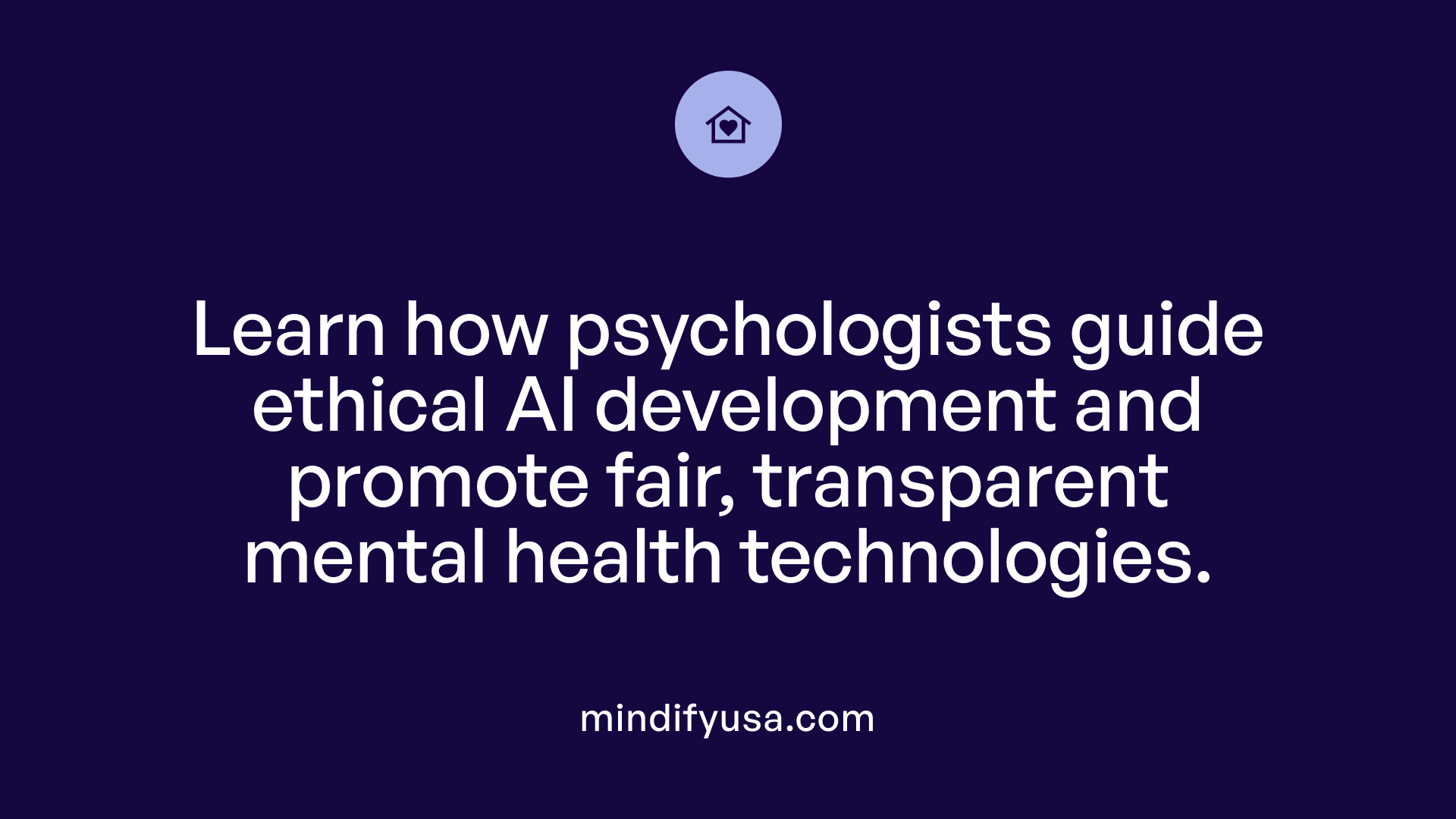
What is the role of psychology in AI integration?
Psychologists are instrumental in ensuring that AI systems are developed and used responsibly within the field of mental health and beyond. Their expertise in understanding human cognition, emotion, and behavior guides the creation of AI tools that are both effective and ethically sound. Psychologists analyze and interpret AI outputs critically, helping to identify biases, inaccuracies, or potential harms that could unexpectedly affect users, especially those from diverse backgrounds.
Furthermore, psychologists advocate for transparency and fairness in AI deployment. They develop and promote ethical guidelines that safeguard patient privacy, consent, and the integrity of clinical data. Their involvement helps ensure AI systems support human-centered care, enhancing therapeutic relationships rather than replacing the human element.
In addition, psychologists participate in training clinicians, researchers, and AI developers on AI's ethical use and limitations. They foster AI literacy, which is essential for evaluating AI-driven decisions and interventions responsibly. Through these roles, psychologists help balance innovation with the preservation of core psychological principles such as empathy, confidentiality, and cultural sensitivity.
Overall, the psychologist’s role extends from designing ethically aligned AI tools to maintaining oversight in their application. Their contributions are crucial for integrating AI safely into mental health practice and other domains, shaping a future where technology augments human well-being without compromising ethical standards.
Advancing with Caution and Compassion
While AI offers transformative potential in psychological evaluations, its integration must be guided by ethical principles, rigorous validation, and ongoing oversight. Combining technological innovation with human empathy and professional judgment will ensure that AI-enhanced assessments improve mental health outcomes responsibly and equitably. As the field evolves, fostering collaboration among psychologists, technologists, and policymakers will be essential to harness AI’s benefits while addressing its challenges, ultimately advancing mental health care with compassion and integrity.
References
- AI is changing every aspect of psychology. Here's what to watch for
- Application of Artificial Intelligence on Psychological Interventions ...
- Artificial intelligence is reshaping how psychologists work
- ABPP - AI, Mental Health, and Forensics: Is This the Future?
- Artificial intelligence in positive mental health: a narrative review
- Psychological assessment of AI-based decision support systems
- (PDF) The Role of Artificial Intelligence in Psychology - ResearchGate
- The Ethical Use of AI in Psychology: How Can Psychologists Save ...
- Artificial intelligence in mental health care
- Future of Psych Testing AI & ML Impact - Bright Pine Behavioral Health






































































































